|
|
|
Sort Order |
|
|
|
Items / Page
|
|
|
|
|
|
|
| Srl | Item |
| 1 |
ID:
096191


|
|
|
| 2 |
ID:
109813
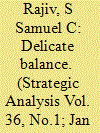

|
|
|
|
|
| Publication |
2012.
|
| Summary/Abstract |
India's foreign policy interactions with Israel are marked by a political discreetness which is in contrast to its prominent political engagement with the Palestinians and countries of the Arab world. India plays down its robust defence engagement with Israel, censures Israeli policies regarding the Palestinians, supports Palestinian-related resolutions at multi-lateral forums like the UN, differs strongly from Israeli policy on issues such as Iran's nuclear programme while being opposed to the possibility of Iran acquiring nuclear weapons capability. This policy has expanded the space for India to pursue its foreign policy and national interest goals, as attested to by the robust political and economic interaction with the Palestinians and the Arab countries, and rising defence and economic engagement with Israel despite certain domestic constituencies opposed to such a partnership. However, the limitations of such a policy include the minimal role that India has been able to play in the Middle East peace process, 'diplomatic heartburn' of an ally deeply involved in the security sphere-as is evident in the Israeli reaction to the Indian stance on the Goldstone report, for instance-and limited 'comfort zones' if crisis situations arise. Greater political engagement could be a bulwark against such tendencies and also provide important opportunities to convey India's concerns regarding the Palestinians more forcefully.
|
|
|
|
|
|
|
|
|
|
|
|
|
|
|
|
| 3 |
ID:
095429
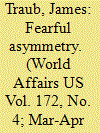

|
|
|
|
|
| Publication |
2010.
|
| Summary/Abstract |
In the first minutes of Israel's assault on Gaza on December 27, 2008, F-16s fired missiles into the police headquarters and three police stations, killing ninety-nine policemen (and nine civilians). Israel viewed Gaza's police as an ancillary wing of Hamas, the political and military force which governs Gaza, to be mobilized as soldiers in times of war. The wave of attacks thus constituted a preemptive strike at Hamas's military infrastructure. Israeli strikes would kill a total of 248 members of Gaza's police force in the course of the Cast Lead operation. But these men were, in fact, policemen; had Israel not invaded Gaza that day, many would have gone off to direct traffic and do the other things police officers do elsewhere. Were they civilians or were they combatants? The report of the U.N. Fact Finding Mission on the Gaza Conflict, known as the Goldstone Report (after Richard Goldstone, the South African jurist who served as chief investigator), concluded that the attack on the police stations violated principles of international humanitarian law, which require those who wage war to minimize harm to civilians. The report cites the attack as only one of many instances where the Israel Defense Forces (IDF) may have committed war crimes.
|
|
|
|
|
|
|
|
|
|
|
|
|
|
|
|
| 4 |
ID:
113989
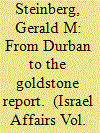

|
|
|
|
|
| Publication |
2012.
|
| Summary/Abstract |
Disproportionate and unsubstantiated allegations of human rights violations, war crimes and racism have been employed as a form of political warfare designed to isolate Israel internationally. This strategy, based on the model used to defeat the apartheid government in South Africa, was adopted in 2001 at the NGO Forum of the UN-sponsored Durban Conference on racism, in which 1500 organizations participated. Since then, as demonstrated in this article, many human rights NGOs have consistently supported the political agenda of the Organization of the Islamic Conference (OIC), whose members dominate the UN Human Rights Council. In the decade following the Durban conference, the NGO network has issued frequent condemnations of Israel based on false or unverifiable allegations of human rights abuses and 'war crimes'. The NGO campaigns, led by international groups such as Human Rights Watch and Amnesty International, are central in this process, from Jenin (2002), through the UNHRC's Goldstone Report on the Gaza war (2009). Journalists, academics, diplomats, political leaders, and legal officials in liberal Western democracies frequently cite these generally unsubstantiated allegations in condemning Israeli policies, reflecting the 'soft power' of these NGOs acting to reinforce the Palestinian narrative and the objectives of the OIC.
|
|
|
|
|
|
|
|
|
|
|
|
|
|
|
|
| 5 |
ID:
096419


|
|
|
| 6 |
ID:
096189
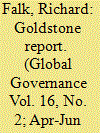

|
|
|
| 7 |
ID:
096185
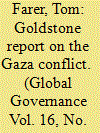

|
|
|
|
|
| Publication |
2010.
|
| Summary/Abstract |
By concluding that, in its assault on Gaza under the rubric of self-defense, Israel had targeted the civilian infrastructure and consciously "punished" the civilian population and demonstrated indifference to the suffering of noncombatants and engaged in other acts in violation of the laws of war, behaviors that possibly constituted in their totality crimes against humanity, the Goldstone Report became almost as controversial as the events precipitating it. In this agora, four eminent international lawyers, a mix of scholars and practitioners, assess from their distinctive perspectives the report's methodology, its compliance with fact-finding norms, and the overall quality of its effort to apply norms of international law to a bloody event in the ongoing multidecade conflict between Jews and Arabs over the governance and division of the former British-controlled Palestinian Mandate. Dialectically, they help to structure future debates over UN-sponsored fact-finding and also the normative parameters of the use of force by powerful states engaged in asymmetrical conflicts.
|
|
|
|
|
|
|
|
|
|
|
|
|
|
|
|
| 8 |
ID:
096188


|
|
|
| 9 |
ID:
096187


|
|
|
|
|
|
|
|